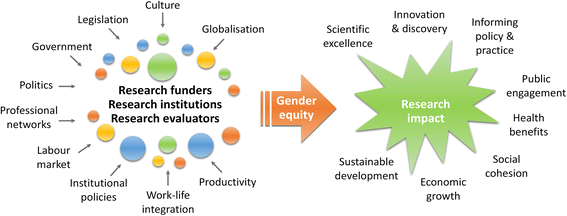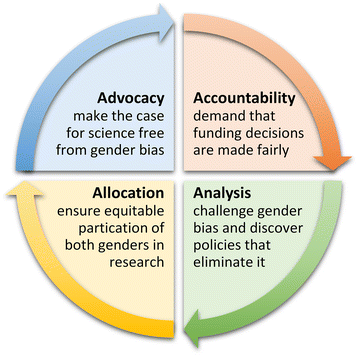A global call for action to include gender in research impact assessment
- PMID: 27432056
- PMCID: PMC4950803
- DOI: 10.1186/s12961-016-0126-z
A global call for action to include gender in research impact assessment
Abstract
Global investment in biomedical research has grown significantly over the last decades, reaching approximately a quarter of a trillion US dollars in 2010. However, not all of this investment is distributed evenly by gender. It follows, arguably, that scarce research resources may not be optimally invested (by either not supporting the best science or by failing to investigate topics that benefit women and men equitably). Women across the world tend to be significantly underrepresented in research both as researchers and research participants, receive less research funding, and appear less frequently than men as authors on research publications. There is also some evidence that women are relatively disadvantaged as the beneficiaries of research, in terms of its health, societal and economic impacts. Historical gender biases may have created a path dependency that means that the research system and the impacts of research are biased towards male researchers and male beneficiaries, making it inherently difficult (though not impossible) to eliminate gender bias. In this commentary, we - a group of scholars and practitioners from Africa, America, Asia and Europe - argue that gender-sensitive research impact assessment could become a force for good in moving science policy and practice towards gender equity. Research impact assessment is the multidisciplinary field of scientific inquiry that examines the research process to maximise scientific, societal and economic returns on investment in research. It encompasses many theoretical and methodological approaches that can be used to investigate gender bias and recommend actions for change to maximise research impact. We offer a set of recommendations to research funders, research institutions and research evaluators who conduct impact assessment on how to include and strengthen analysis of gender equity in research impact assessment and issue a global call for action.
Keywords: Athena SWAN; Call for action; Gender; Health research; Path dependency; Research impact assessment; Science policy.
Figures
References
-
- Edmunds LD, Ovseiko PV, Shepperd S, Greenhalgh T, Frith P, Roberts NW, et al. Why do women choose or reject careers in academic medicine? A narrative review of empirical evidence. Lancet. 2016;pii: S0140-6736(15)01091-0. doi:10.1016/S0140-6736(15)01091-0. Ahead of print. - PubMed
MeSH terms
LinkOut - more resources
Full Text Sources
Other Literature Sources
Miscellaneous



